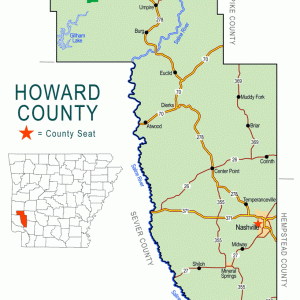calsfoundation@cals.org
Duckett Ford (Howard County)
aka: Duckett Crossing (Howard County)
Duckett Ford (a.k.a. Duckett Crossing) was one of nearly a dozen places to cross, or ford, the Cossatot River in northern Howard County. According to a 1913 map, there were eleven fords in the twenty-plus-mile length of the river that separated Duckett Township from the rest of Howard County. Duckett Ford, however, had the advantage of being a straight shot between Wickes (Polk County)—and the Kansas City Southern Railway (KCS) that created it in 1897—and Galena (Howard County). Families who controlled low water crossings, such as Allen Turner Duckett’s family, could benefit financially. After the automobile and good roads came to the Ouachita Mountains, fords like this one became relics, and the Cossatot River became a whitewater tourist attraction.
Little is known about Duckett Ford, including the details of when the Ducketts first took possession of it, although it may have been as early as 1890. Duckett and his family had moved to what is now Duckett Township in about 1876, and they eventually moved to Duckett Ford. His daughter Mellie Duckett Childs sometimes helped people across the Cossatot River. According to Mellie Childs’s son V. L. Childs, “She ran a ferry across the Cossatot at times when the men were not around,” including a time when she had to ferry someone when she was only eleven years old, which would have been in 1893 or 1894, after her mother—Duckett’s first wife Sarah Bell Duckett—died in 1893. Duckett’s second wife Sarah Brock Duckett homesteaded the quarter section that included Duckett Ford, filing her claim in September 1895 (just weeks before their marriage) and proving up the claim in 1904, but Allen Turner Duckett may well have been squatting there earlier.
In 1898, federal deputies used Duckett’s place, which was “thirty-five miles from any railroad station,” in their efforts to arrest illicit distillers “in the mountains of Polk County” three miles from Grannis (Polk County) and were ferried across the river.
In about 1899, Duckett reportedly sent a threat to the United States’ General Land Office, written in blood, warning against interfering with his possession—presumably of this same ford. In April 1904, Duckett reportedly changed the road “leading from Duckett ferry to Wicks [sic] and Grannis [sic, probably Galena].” He also placed a notice threatening a would-be homesteader and road re-router, writing, “No man on earth or in hell can homestead this land and live on it….I am none but a bullet hole, and all that interfere can take warning.” This vigorous protection of access to the Cossatot River crossing suggests its value.
As bridges were built across the Cossatot River and as autos replaced wagons, the need for privately held fords and ferries declined. Duckett’s youngest child, Ova Duckett Thomas, kept the house until her husband’s death in 1952. Milly Cotten Temple (1925–2023) remembered her family stopping at Duckett Ford on their way to church at Baker Springs (Howard County) to let the wagon’s wooden wheels soak up water.
Gillham Dam largely put an end to the remains of Duckett Ford, with a mournful last pilgrimage to the free-flowing Cossatot River calling for “canoeists [to] assemble at the Gillham Dam site, the state Hwy 4 bridge over the river between Wickes and Umpire and Duckett Ford road below Duckett Falls” in May 1973. The road leading to the crossing is still there in the twenty-first century, but it is only accessible when the water is low.
For additional information:
Childs, Lisa C. “Forging Community in the Ouachita Foothills of Southwest Arkansas: Duckett Township, Homesteading, Distilling and Race.” MA thesis, University of Arkansas, 2022. Online at https://scholarworks.uark.edu/etd/4782/ (accessed March 5, 2024).
Jones, Inez. “Double 50th Wedding Anniversary Celebration, 1933–1983.” Rural Arkansas (September 1983): 12–15.
“Pilgrimage at Cossatot to Be Last.” Arkansas Gazette, May 2, 1973, p. 22B.
Stapleton, Isaac. Moonshiners in Arkansas. N.p.: Zion’s Printing and Publishing Co., 1948.
Lisa C. Childs
Fayetteville, Arkansas
 Howard County Map
Howard County Map 



Comments
No comments on this entry yet.